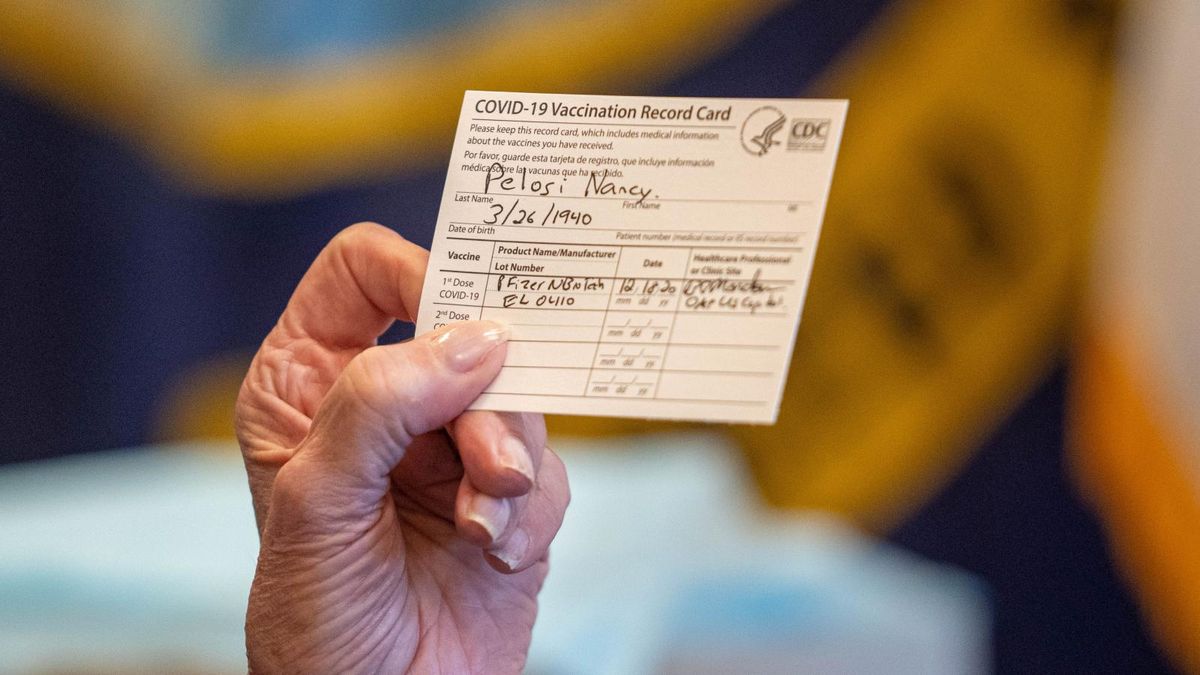The debate over vaccine passports, explained

A few minutes every morning is all you need.
Stay up to date on the world's Headlines and Human Stories. It's fun, it's factual, it's fluff-free.
For critics of the vaccine passport initiatives, the risks of privacy violations far outweigh the upsides.
On April 6, the Biden administration put to rest any notion that the federal government would be instituting a COVID-19 “vaccine passport” program in the United States. This follows weeks of speculation and concern that President Joe Biden was directing administration officials to work with private companies to create some sort of verification that a person had been vaccinated.
“The government is not now, nor will we be supporting a system that requires Americans to carry a credential,” White House press secretary Jen Psaki assured reporters on April 6.
“There will be no federal vaccinations database and no federal mandate requiring everyone to obtain a single vaccination credential.”
On the same day as the White House’s announcement, Texas Governor Greg Abbott signed an executive order prohibiting the creation of vaccine passports by any state agency. Days earlier, Florida Governor Ron DeSantis had signed a similar executive order for his state, writing, “so-called COVID-19 vaccine passports reduce individual freedom and will harm patient privacy.”
Both Abbot and DeSantis are Republicans, suggesting that the opposition to vaccine passports comes primarily from conservative parts of the country.
However, even with the recent announcement from the Biden administration, it is unlikely that the debate over vaccine passports is going to quiet down, especially as private companies and other countries continue to consider their feasibility.
Proof of vaccination
In late March, The Washington Post reported that the Biden administration was working with private companies on an initiative to develop vaccine passports.
“The effort has gained momentum amid President Biden’s pledge that the nation will start to regain normalcy this summer,” the Post reported, “with a growing number of companies — from cruise lines to sports teams — saying they will require proof of vaccination before opening their doors again.”
At the time, the reporting stated the initiative was being headed up by the Department of Health and Human Services as the administration worked to coordinate an unprecedented vaccination effort. The passports were expected to be some sort of digital item, similar to an airline boarding pass, that could be accessed and presented on a smartphone.
Similar ideas have already been adopted in other countries, including Israel, where a “green pass” mobile app was put into effect in mid-February. Now, with more than half of the country vaccinated, the Israeli vaccine passport gives citizens who have received both shots the freedom to visit bars, hotels, gyms and other public places.
The United Kingdom is currently considering the idea of a vaccine passport as well. The government is in the process of figuring out how such a passport would function and if it would be limited to people who had been vaccinated or would also be available to those who had tested negative for COVID-19 or had previously had the virus.
Other countries that have already launched some form of digital vaccine passport include Japan, China, Australia and New Zealand.
For these countries, the passports are not only required for citizens to return to normal life, they are required for foreign travelers to enter. The European Union will reportedly launch its “Digital Green Certificate” in June.
Opposition to vaccine passports
The goal of vaccine passports is to allow citizens to return to something resembling normalcy, with private businesses able to fully reopen and international travel back on the table. An ancillary effect is it could also encourage people who are reticent to receive the vaccine to get vaccinated, thus helping to ensure populations can achieve herd immunity.
For critics of the vaccine passport initiatives, though, the risks of privacy violations far outweigh the upsides. In his executive order, Governor Abbott wrote, “Government should not require any Texan to show proof of vaccination and reveal private health information just to go about their daily lives.”
Writing for The Spectator, writer and podcaster Bridge Phetasy explains why she “hates” what she calls “vaxports.”
“It’s a very simple question: do I trust the government, Big Tech and corporations not to abuse this power? The answer is NO. Absolutely not. And why should I? Why would anyone? I could have just stopped at ‘do I trust the government, Big Tech and corporations?’ Opposing vaccine passports seems like something that should unite people across the entire political spectrum.”
Opposition to the passport isn’t merely a political argument in the US, though. The World Health Organization (WHO) has opposed the practice, saying it raises “ethical issues regarding equity,” particularly in how it relates to developing countries that are still struggling to get vaccinated.
“If you don’t have access to a vaccine in the country,” said Dr. Mike Ryan of WHO, “then you will effectively become isolated as a country as vaccine passports kick in.”
Regardless of the opposition, though, it appears private companies and universities may still require proof of vaccination from their clients. As such, people who refuse to get the COVID-19 vaccine may find themselves barred from some public spaces, as well as from traveling, both domestically and internationally.
Have a tip or story? Get in touch with our reporters at tips@themilsource.com




Comments ()